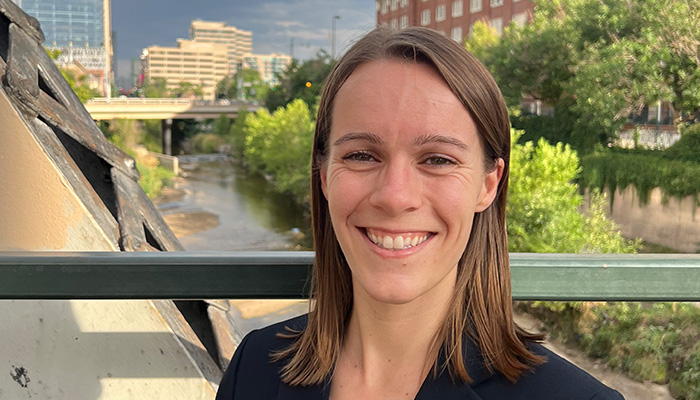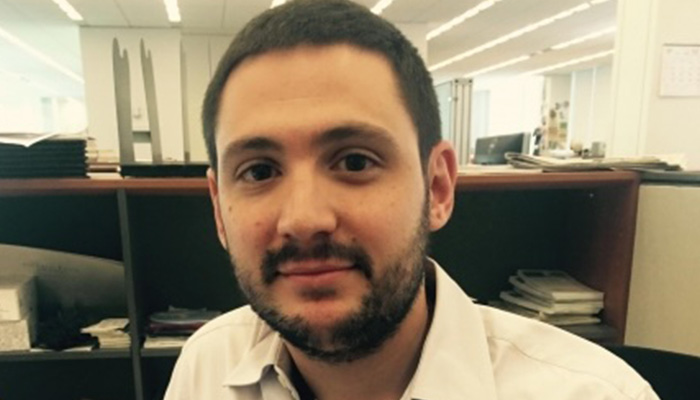Social Policy in Action
Social Policy: It’s half our name and one of our most popular undergraduate concentrations. But let’s be honest: People often aren’t sure what social policy actually means.
As one of the first schools of education and social policy in the nation, we officially embraced the phrase and added social policy to our name and mission in 1986, under then-dean David Wiley, to reflect a universal truth: Learning is lifelong and happens in the home, the workplace, and the community. In general, social policy addresses societal needs such as healthcare, education, housing, and employment. Read on to learn what it means to our alumni and the role it plays in their lives.

Sarah Carthen Watson, Civil Rights Attorney
Sarah Carthen Watson (BS15) isn’t interested in telling her clients what to do; instead, she treads lightly, listening first and asking questions. “It’s coming into situations with a humble mentality, building organic relationships, and using my degrees to help people in the way they want,” she says. “They are the experts in their own lives, and litigation isn’t always the best tool.”
A civil rights attorney for the Shriver Center on Poverty Law’s Legal Impact Network, Carthen Watson sees social policy in much the same way. Instead of assuming policy solutions are correct because they were devised by so-called experts, “you look directly to different groups to see how they’ve been impacted by policies over time,” she says.
Some policies may need to be tailored to benefit multiple groups—or rejected if they help some groups but have unintended adverse consequences for others. “For me, social policy is the interplay of public policy, sociology, and politics wrapped into one.”
Carthen Watson first explored policy drafting and analysis as a member of her Minneapolis high school debate team, where she found her voice arguing about issues like universal healthcare.
During a Northwestern campus tour, her guide mentioned he was a social policy major. Curious, she later googled the term and found it named exactly what she was looking for. “I always wanted to help people,” she says, “and I was really interested in how people could be helped on a mass scale.”
Before joining the Shriver Center, Carthen Watson worked as legal director for the Louisiana Fair Housing Action Center, where she managed a docket of more than 100 cases and represented clients in housing and eviction cases in state and federal courts, including the Fifth Circuit Court of Appeals.
As the movement lawyer at the Legal Impact Network, Carthen Watson is helping a collective of state and local advocacy groups. While she misses litigation, she’s thrilled to be guiding strategies on critical policy issues, including housing, healthcare, and expungement—the process of erasing people’s criminal records. The issue of corporate greed is never far from her mind.
“It bleeds into everything from housing to healthcare,” she says. “I see not only the greed and self-interest but also the absolute disdain that a lot of people with money and power have for people without it. “People are really at a breaking point. That hurts my heart but also makes me incredibly hopeful. It means that people are ready to fight for a better world, and I’m honored to help them do so.” -- Julie Deardorff

Renee Wellman, Executive Director of Green Corps
One day she’s strategizing; the next she’s fundraising. But whether she’s training organizers or recruiting, Green Corps executive director Renee Wellman (BS16) is using her social policy background to help solve environmental problems.
Social policy is at the heart of all our work because it shapes the fabric of our daily lives and the health of our environment,” she says. “People often want to avoid politics, but our system doesn’t work properly when we leave it to a small number of elected officials, administrators, and advocates. We need more engaged citizens and fewer armchair quarterbacks.”
Green Corps offers a one-year, paid training program for aspiring environmental organizers, which has been completed by more than 400 people, including Wellman. Green Corps also partners with organizations that craft environmental policies and lobby government officials, but much of the day-to-day work focuses on teaching people how to advocate for their beliefs and values.
For much of last year, Wellman’s team ran the Save Money, Save the Environment campaign to raise awareness about the financial benefits of clean energy and energy efficiency programs in the Inflation Reduction Act. This year’s priorities include advancing clean energy and reducing the use of toxic pesticides.
For Wellman, a country’s policies reflect its values. Social policy, she says, gives society a framework to “organize, govern, and allocate resources.” An environmental advocate since learning about climate change in middle school, she came to Northwestern precisely to learn how to shape policies to prevent and solve major environmental problems, earning an undergraduate certificate from Northwestern’s Paula M. Trienens Institute for Sustainability and Energy.
Her classes “went beyond political theory and addressed the real impacts, costs, and benefits of policy design and implementation,” she says. Outside of class, Wellman interned with the Sierra Club and National Resources Defense Council.
She worked to change Northwestern’s food culture, campaigning for locally grown food and fair labor practices and serving as copresident of the Wild Roots campus vegetable garden. As a member of Northwestern’s cross-country team, Wellman led an initiative to address sustainability issues among athletics teams and facilities that included a campus wide shoe drive and promoting recycling at competitions.
In 2014 she received the Udall Foundation congressional scholarship award for her environmental work. Last year she earned a master’s in public affairs with a concentration in policy analysis at Indiana University.
“I do this work because I believe in what groups of like-minded citizens can do when they work together,” she says. “I am constantly inspired by the ripple effects of smart grassroots organizing.” -- Julie Deardorff

Ben Protess, Investigative Reporter
Ben Protess (BS06) wasn’t sure he wanted to be a journalist, but after he obtained a fellowship that involved working as a beat reporter for a community newspaper on Chicago’s West Side, his path became clear.
Now a New York Times investigative reporter who covers President Donald Trump, Protess calls social policy “a window into a million other professions and opportunities,” including journalism, law, and teaching.
“My beat at the Times unites my Northwestern experiences,” he says. “It’s the policy and politics I was exposed to in SESP and the journalism training I received through the Public Interest Program (PIP) fellowship.”
Launched in 2005 by SESP undergraduates Jonathan Marino (BS06) and Lauren Parnell Marino (BS07), the fellowship places recent graduates at Chicago area nonprofits or civic organizations for up to a year.
Protess, who had been toying with the idea of law school, joined the first PIP cohort in 2006 and covered local issues for the North Lawndale Community News. After the fellowship, he moved to New York to get his master’s degree in journalism at Columbia University, where he now teaches part-time. He then worked for ProPublica and the Huffington Post before joining The New York Times as a business reporter in 2010.
As the US reeled from a financial crisis, Protess produced a series of stories on Wall Street lobbyists’ influence over financial legislation. He also cowrote an investigation of the private equity industry and its expanding role in everyday American life before he shifted focus to Trump after the inauguration in 2017.
Perhaps journalism was already in Protess’s blood: His father, David, was a prominent Medill professor who founded the Medill Innocence Project, which works to free the wrongly convicted.
But the younger Protess says his interest was cemented by the combination of studying the social problems people face and the on-the-ground training he received in college.
Experiences during his undergraduate days, such as working at Saint Leonard’s House, which provides housing and support for formerly incarcerated men, “helped me see the interplay of public policy and how it actually impacts human life and a community. SESP was a place where I got a real-world education.”
Young, passionate journalists are needed now more than ever, Protess says, not only to do the hard work of reporting the news but also to find new ways to build audiences at a time when readers are distracted and fatigued. “I still wake up inspired to do the work of holding the nation’s most powerful people accountable,” he says. “It’s an important responsibility, and it happens to be a lot of fun." -- Grace Gormley
